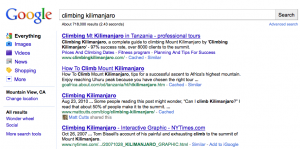March 2, 2011
The rise in importance of social media was demonstrated this month with the announcement that Google were giving increasing prominence to results from social networks.
On February 17th Google launched major updates to Social Search, integrating information from Twitter, Flickr and Quora throughout its search engine – with Facebook conspicuous by its absence. This is undoubtedly because of partnership agreed between Microsoft and Facebook that brings “Like” data and profile search to Bing. This means Google doesn’t receive Facebook data that happens on personal Facebook walls in the way that Bing has been getting from Facebook. Google still doesn’t even have access to Facebook Like data because it objects to some of Facebook’s terms and conditions for having access to this information.
Indeed, it is almost certainly because of this rivalry and the competition posed by Facebook that Google has launched so many updates over the last few years in an effort to unite social and search. These reasons also mean that there will be a lot more updates from Google in the future to keep pace with the growing popularity of social media.
In summary: what the new changes mean
The new changes provide the ability to see results based on what the people you follow, and are connected to, are viewing and sharing. This means that if you are logged into your Google Account you may begin to see listings shared by your connections within organic search results.
Here are the most important aspects of these changes and how they will change your Google experience:
- Possibly the most important result of Google’s changes is that there will be a huge increase in social media’s appearance in search – now any content shared by your friends on Twitter, Flickr and new Q&A site Quora may now appear in your search results.
- The outcome of this is that different people will see different results. That’s because results will now be based on your individual relationship with the people who have shared content. The stronger your connection, the higher it will be found in the organic listings.
- By allowing users to connect their social profiles to their Google accounts the search giant can judge the strength of your connections by cross referencing your friends on Google’s network of sites and seeing if that list matches your friend list on other social networks such as Twitter. This will in turn influence your search results.
So, social search results will now be found with all other results, not just along the bottom of the page. However, it will be easy to spot which results are taken from social networks – they will be indicated by a sentence underneath the URL which will tell you which of your connections shared the link. As you can see below (click on the image to make it larger):
Much has been made of the battle between social and search but it seems that they are becoming more and more closely integrated. The question is: will Google and Facebook ever be able to resolve their differences?


Comments